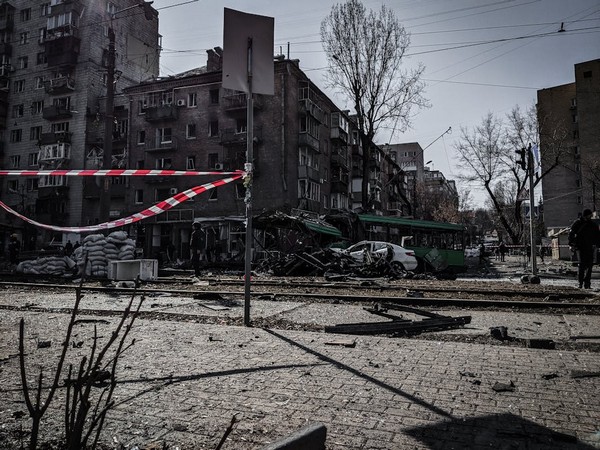The Israel-Gaza war is at a crossroads
Apr 04, 2024
Gaza [Palestine], April 4: All except the shortest wars have times when killing is an unchanging, grim routine. There are also moments, like the last few days in the Middle East, when events leave belligerents and their allies at a crossroads with big decisions to make.
Choices are confronting leaders in the governments and armed forces in Israel and Tehran, at Hezbollah's HQ in the southern suburbs of Beirut and further afield in the Gulf, Europe and America.
The killing of foreign aid workers in Gaza might finally exhaust the considerable patience of Israel's allies, led by the United States.
Israel and Egypt have banned foreign journalists from entering Gaza, except on occasional, highly controlled and brief visits with the Israeli military. Belligerents need to win the media battle in an age of asymmetric warfare where victory or defeat can rely on perceptions as much as the realities of battle. Journalists are also denied access to a war when the parties fighting it have something to hide.
But even without foreign reporters on the scene, evidence is piling up that Israel is not, as it claims, respecting its obligations under the laws of war to respect civilian lives, or allowing the free movement of aid in a famine created by Israel's own actions. After the World Kitchen team was killed in Gaza, President Biden used his strongest language yet in public statements to condemn Israel's actions.
The president and his aides have now to decide whether words are enough. So far, they have resisted calls to put conditions on the use of American weapons in Gaza, or even to turn off the supply line.
While the weapons still arrive, Israel's Prime Minister Benjamin Netanyahu, who depends on hardline Jewish ultranationalists to stay in office, might feel he can still afford to defy President Biden. A major test will be the offensive Israel wants to attack Hamas in Rafah, plans the US believes would compound the humanitarian catastrophe in Gaza. American interests and Joe Biden's political prospects in an election year have already been damaged by what is seen in many countries as complicity with Israel.
In another change this week, Mr Netanyahu has come back to work after two days off for hernia surgery to huge demonstrations demanding his resignation and early elections for a new parliament. Deep cultural and political fissures between Israelis that were put to one side after 7 October are wide open again and being shouted about in the streets. The prime minister is in political trouble, blamed by his opponents for letting down Israel's guard so badly that Hamas detected a chance to attack.
Millions of Israelis who believe they are fighting a just war against Hamas have no confidence in Mr Netanyahu. Their charge sheet includes prolonging the war to put off the moment when he is held accountable for his mistakes, failing to bring Israel's hostages home safely, and alienating vital allies starting with President Biden. Add to that the fact that after a huge onslaught over six months Hamas is still fighting, and its senior leader in Gaza, Yahya Sinwar is still alive somewhere in the Strip.
Another new set of calculations about the next stages of the crisis in the Middle East arise from the assassination of a senior Iranian general in Damascus, widely assumed in Israel to be the work of its air force. It was a coup for intelligence services that missed or ignored the Hamas attacks six months ago. It was also an escalation in the wider war in the region that will have consequences.
Some of them may happen close to where I'm writing this, looking across the Sea of Galilee towards the Golan Heights, the large swathe of southern Syria that Israel captured in the 1967 Middle East war and later annexed. As the crow flies, Damascus is less than 50 miles from here. The border with Lebanon is close by. At night, especially, there is constant Israeli air activity, with the roar of jets on patrol, or heading off to bomb Lebanon or Syria.
A shadow war has been fought here in parallel with the war in Gaza since last October. It started with Hezbollah, the powerful Lebanese militia and political movement attacking Israel, in support of Hamas in Gaza. It was not the onslaught that the Hamas leadership was hoping for - neither Hezbollah or its patrons in Tehran wanted an all-out war with Israel and, indirectly, its American backers. The Americans did not want that either and restrained Israel's instinct to respond in full force.
But Hezbollah still tied down thousands of Israeli troops and forced the evacuation of something like 80,000 civilians from the border areas. Israel's response, limited compared to earlier border wars, forced the displacement of at least as many civilians on the Lebanese side.
Since the start of this year it has been different. Israel has been setting the pace, bombing its enemies deeper inside Lebanon and Syria. The biggest leap up the ladder of escalation came on Monday with the assassination by air strike on the Iranian diplomatic compound in the Syrian capital.
In interviews here in northern Israel local officials and residents have expressed strong support not just for the assassination but for an invasion of south Lebanon to destroy Hezbollah and force them back from the border.
They were not put off by Israel's experience in the last two decades of the 20th Century, when it occupied a broad strip of South Lebanon to try to protect northern Israel. It even created its own Lebanese militia to help with the fighting. The Israelis pulled out in 2000, under constant military harassment from Hezbollah, after prime minister Ehud Barak, a former head of the army, decided that occupying south Lebanon (Israel called it the "security zone") did not make Israelis any safer and wasted the lives of its troops.
I walked through the ruins of the Avivim winery, which is right on the border wire. It was destroyed in a Hezbollah strike last week. Its owner Shlomi Biton showed me through the wreck of his business. He is 47 and was born in Avivim, which like the rest of northern Israel has become a ghost town after the evacuations. Shlomi fought in Lebanon during his military service, and now believes that the only way to restore a decent and safe life is for Israel to return to Lebanon for a decisive battle with Hezbollah.
"There's no other choice," he told me next his burnt-out business. "Otherwise, the community won't return to live here, maybe just a few crazy guys like me - the children won't come back."
In Kiryat Shmona, a border town where 25,000 Israelis lived, no more than 3,000 people, mostly soldiers and essential workers, are left. The Mayor, Avichai Stern, showed me deserted districts and wrecked buildings. He believes that Israel can remove Hezbollah's threat to the north with a decisive and destructive invasion on the lines of the Gaza war.
Mayor Stern said last year 10,000 Hezbollah fighters practised taking over northern Israel.
"It can happen here" he told me, "just like Gaza. They weren't training to direct traffic in Beirut. The only way to stop it is to go into Lebanon eliminate this threat as soon as possible."
Exactly six months ago, in deadly secrecy, Hamas was putting the finishing touches to the battle plan it called al-Aqsa flood. The killing on 7 October and everything that has followed destroyed lazy, wishful thinking that it was possible to manage the century-long conflict between Arabs and Jews for control of the land between the river Jordan and the Mediterranean Sea.
Hamas thrust the conflict back to the top of the world's agenda when it killed around 1,200 people, mostly Israeli civilians, and took more than 250 Israelis and foreign citizens into Gaza as hostages. Many of the 134 Israelis still there are thought to be dead. It was Israel's worst single day since it won its independence war in 1948.
The "mighty vengeance" that Mr Netanyahu promised has so far killed more than 32,000 Palestinians, a majority of whom were civilians. Israel's American-supplied firepower has flattened most of Gaza. The war has spread across the Middle East. It might now be entering a new phase.
The borderlands between Israel and Lebanon are deceptively beautiful in the first few weeks of spring.
Wildflowers and pinecones, not shrapnel, were underfoot as I walked along a stretch of the border with Israeli military officers. Any sense of peace was, of course, an illusion on one of the most dangerous borders in the Middle East. Iran and Hezbollah are making decisions about how to respond to the assassinations in Damascus and the way Israel is increasing the military pressure in Lebanon. The two allies will want to calibrate their response to avoid a wider, devastating war that neither wants.
Israel does not want that war either. But the audacious assassination at the Iranian diplomatic compound in Damascus could be a sign that
Israel believes Iran and the network it calls its axis of resistance might blink first. If so, it is a risky strategy. Iran will want to restore its ability to deter Israel, which is clearly not working. It will try to respond in a way that will catch Israel by surprise.
The empty overgrown border communities are not likely to be Iran's first choice for retaliation. They could try an Israeli target in another country, or cyber-attacks rather than missiles. Or intensify their nuclear programme.
An American envoy, Amos Hochstein, is trying to find a way to revive the UN Security Council resolution that ended the last big war between Hezbollah and Israel in 2006. Neither side has respected it, but it provides a framework for negotiation.
At this crossroads, neither Israel, Iran nor Hezbollah wants an all-out war that would have terrible consequence for all of them. But no side seems ready to stop the slide towards it.
Source: Fijian Broadcasting Corporation








